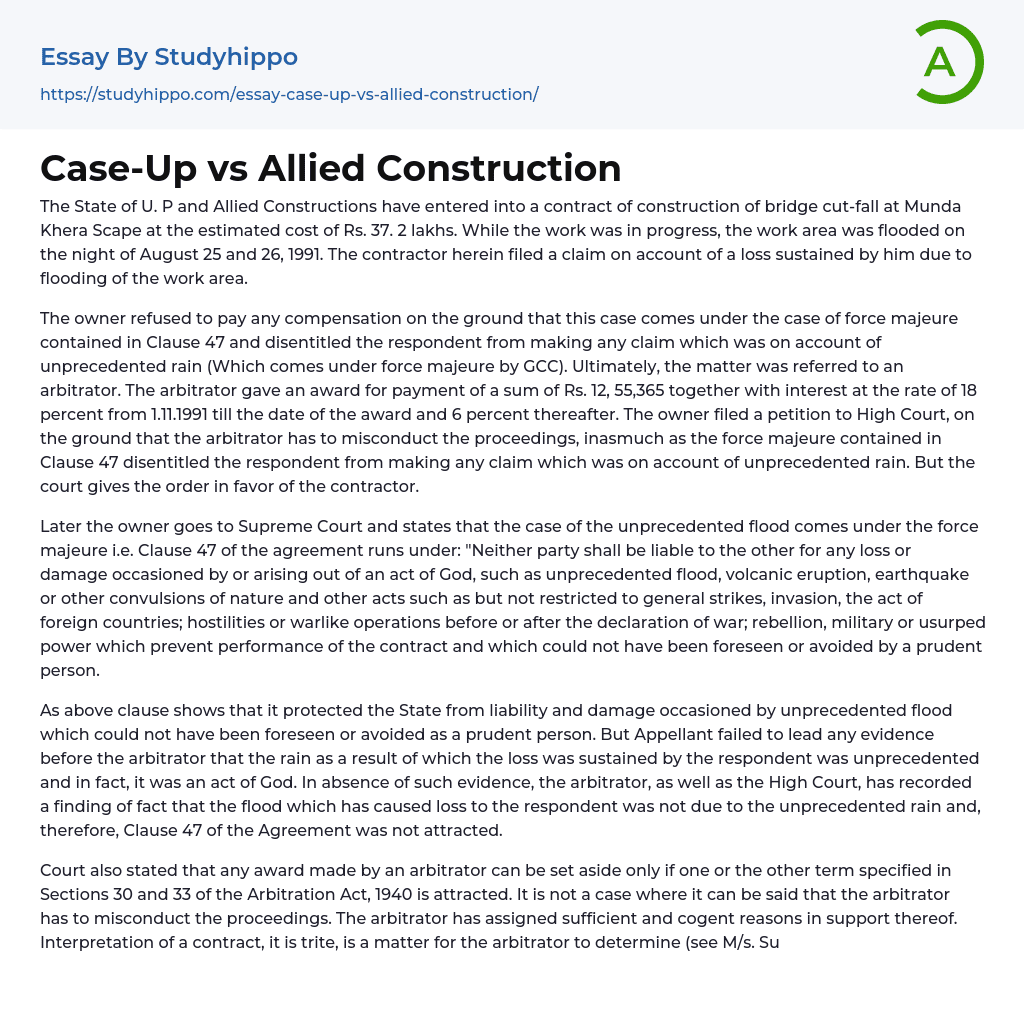The State of U.
P and Allied Constructions have signed a contract to build a bridge at Munda Khera Scape for an estimated cost of Rs. 37.2 lakhs. However, during the construction, the work area experienced flooding during the nights of August 25 and 26, 1991.
The contractor's claim for a loss caused by flooding in the work area was rejected by the owner, citing Clause 47. This clause states that cases of force majeure, such as unprecedented rain, exempt the respondent from making any claims. As a result, the matter was referred to an arbitrator who awarded compensation of Rs.
The owner filed a lawsuit in the High Court, claiming that the arbitrator had mishandled the proceedings. The owner demanded a sum of 12,55,365 with an interest rate of 18 percent from 1.11.1991 until the date of the award and 6 percent therea
...fter. The grounds for this petition were based on Clause 47 which prohibited the respondent from making any claim due to extraordinary rainfall. However, the court ruled in favor of the contractor. As a result, the owner appealed to the Supreme Court arguing that unprecedented flooding qualified as a force majeure event.
The Clause 47 of the agreement states that no party will be held liable for any loss or damage resulting from an act of God, such as a flood, volcanic eruption, earthquake, or other natural disasters. It also covers acts like general strikes, invasion, and war. For this clause to apply, these events must be unforeseeable and unavoidable. The purpose is to protect the State from liability and damage caused by an unexpected flood that couldn't have been predicted or prevented.
However, the Appellant faile
to provide evidence proving that the rain responsible for the respondent's loss was indeed unprecedented and an act of God. Consequently, both the arbitrator and the High Court determined that the flood causing the loss wasn't due to unprecedented rainfall. As a result, Clause 47 of the Agreement does not apply.
The Court stated that an arbitrator's award can only be invalidated if it meets the criteria outlined in Sections 30 and 33 of the Arbitration Act, 1940. In this case, there is no evidence of any misconduct by the arbitrator as they have provided sufficient and persuasive justifications for their decision. It is widely acknowledged that the interpretation of a contract falls under the authority of the arbitrator (refer to M/s.).
The case of Sudarsan Trading Co. v. The Government of Kerala, AIR (1989) SC 890, confirmed that the arbitrator has the power to interpret Clause 47 of the Agreement based on the specific circumstances. As the arbitrator acts as a mutually agreed upon judge and their decision carries legal weight, the Supreme Court found no merit in the appeal and rejected it.
Both parties have reached an agreement to decrease the interest rate from 18 percent to 12 percent. This reduction will be effective from the date the claim is filed until the award date.
- Building essays
- Federal government essays
- Armed Forces essays
- Confederate States Of America essays
- Federal Government Of The United States essays
- Fourteenth Amendment To The United States Constitution essays
- Governance essays
- Parliament essays
- Politics essays
- Jurisdiction essays
- Bureaucracy essays
- Separation Of Powers essays
- Congress essays
- President essays
- United States Congress essays
- Non-Commissioned Officer essays
- Appeal essays
- Revenge essays
- Corporate Governance essays
- Public Service essays
- Income Tax essays
- Supply essays
- Red Cross essays
- Democracy essays
- State essays
- Liberty essays
- Absolutism essays
- Reform essays
- Republic essays
- John Marshall essays
- Bourgeoisie essays
- Developed Country essays
- Elections essays
- International Relations essays
- Left-Wing Politics essays
- Monarchy essays
- Political Corruption essays
- Political Party essays
- Political Science essays
- Sovereign State essays
- United Nations essays
- World Trade Organization essays
- Contras essays
- Dictatorship essays
- Foreign policy essays
- Monarch essays
- Corruption essays
- Foreign essays
- Democratic Party essays
- European Union essays




